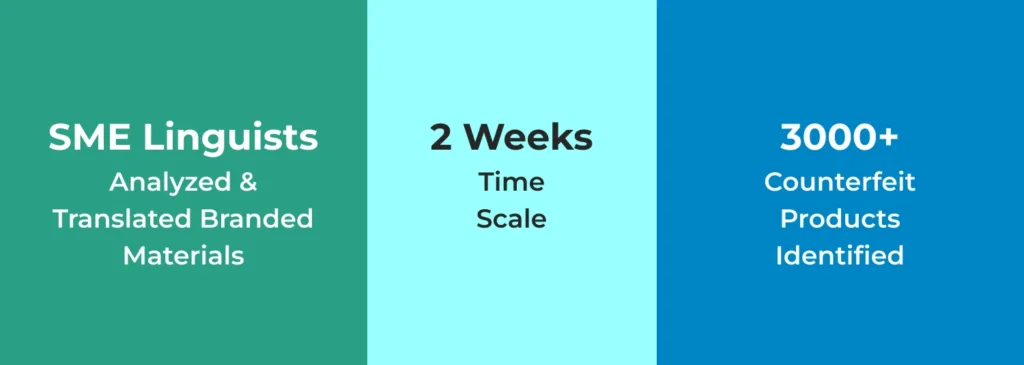CASE STUDY: Combatting Global IP Infringement
Preventing millions of dollars in lost sales for one of the world’s most valuable entertainment brands.

This case study explores our work with a market leader in global entertainment to combat unlicensed merchandise and IP theft in South America, leveraging cultural and subject matter experts in Portuguese and enabling genuine merchandise to be distinguished from unlicensed products.

Scroll 👇 to read the case study. Explore how we partnered with one of the world’s most valuable brands to prevent millions of dollars in lost sales.
The Client
Intellectual property is a key asset and a vital source of revenue for global entertainment companies. This client is renowned for capturing audiences of all ages with its diverse portfolio of films, television shows, and more. With its rich history comes a dedication to upholding the highest standards of creativity, integrity, and brand excellence.
The organization owns an extensive range of IP and harnesses those properties to offer many products, from themed merchandise to interactive experiences and multimedia content.
Unfortunately, the company’s characters and innovative approach to content creation are fertile ground for copycats. It is essential for the client to have the means to detect and combat unlicensed merchandise and IP theft to prevent lost sales and protect its brand integrity.
The Challenge
The client became aware of the proliferation of unlicensed versions of its merchandise, particularly related to popular character lines and related toys, originating mainly from South America. These unauthorized products not only infringed upon its IP rights but also threatened its brand integrity and current and future revenue streams.
As the scale of unauthorized production and distribution escalated, the client’s anti-piracy group recognized the urgent need to identify the sources and distribution channels of these unauthorized products. It was also important that the client maintain consumers’ trust while mitigating against infringement.
The Solution
The client’s anti-piracy group collaborated with Welocalize to determine where these unauthorized products came from and how they were distributed.
Drawing upon its extensive experience helping clients combat IP infringement in regions worldwide, Welocalize jumped into action.
First, we held initial discovery calls with the client to understand the scope of the problem and determine the services required. Then, we engaged our subject matter experts (SMEs) in Portuguese translation and Brazilian culture to identify and analyze the relevant materials, including links, websites, sale posters, and toy store pages.
The SMEs services were allocated based on content type and volume, ensuring that all our translations would be accurate, actionable, and completed quickly. The SMEs played a vital role in distinguishing genuine merchandise from unauthorized replicas.
As translation proceeded, Welocalize identified over 3,000 potential counterfeit products from four manufacturing plants. With that comprehensive analysis in hand, the client was ready to take swift legal action against the illegal distributors.
The Results
Welocalize’s timely translation and analysis, spanning approximately two weeks, enabled the client to quickly gather critical evidence for legal action. Armed with the information, the client initiated legal proceedings, resulting in the shutdown of all four warehouses identified. This halted the production and distribution of unauthorized merchandise and prevented millions of dollars in lost merchandise sales.
Relying on Welocalize’s linguistic expertise and investigative techniques – leading to the swift identification and shutdown of illegal distribution channels – the client’s anti-piracy group safeguarded its IP and brand integrity, ensuring continued consumer trust and loyalty and earning a significant return on its investment. The swift and decisive action will also act as a deterrent against potential future IP violations.
Conclusion
Subject matter experts with deep knowledge of local languages and cultures can play a crucial role in global discovery projects, with the goal of quickly generating accurate translations and identifying counterfeit products and distribution channels.
Welocalize SMEs possess years of local experience and are highly familiar with the cultural and linguistic nuances relevant to the region under scrutiny. In this case, they could immediately determine whether products were legitimate or counterfeit through precise translation and deep knowledge of the cultural context specific to the target market.
Their rapid translation of evidence and assessment of the extent of the counterfeit merchandise problem made it possible for the client to take effective legal action to protect its IP rights before the problem got out of hand.

Global Patent Translation
Welocalize has never had a patent application rejected due to translation.
 Siobhan Hanna
Siobhan Hanna Erin Wynn
Erin Wynn
 Nicole Sheehan
Nicole Sheehan Kimberly Olson
Kimberly Olson Matt Grebisz
Matt Grebisz Christy Conrad
Christy Conrad Chris Grebisz
Chris Grebisz Dan O’Brien
Dan O’Brien